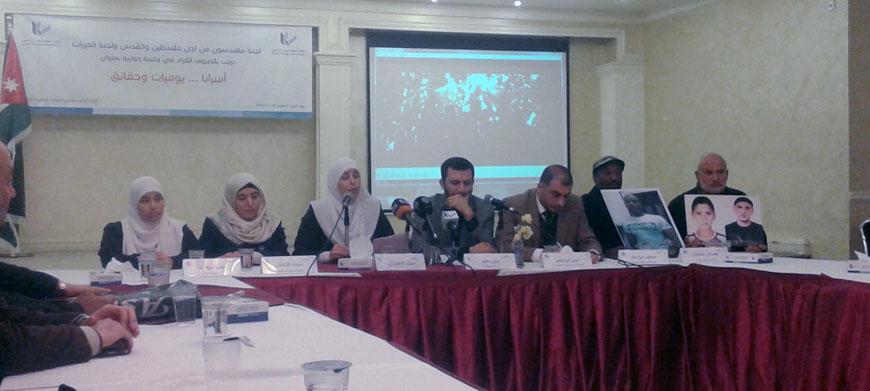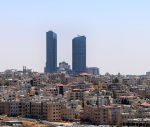You are here
Gov’t urged to provide more support for Jordanians jailed in Israel
By Merza Noghai - Dec 29,2015 - Last updated at Dec 29,2015

Activists and families of Jordanian prisoners in Israel discuss means to support detainees during a meeting in Amman, on Monday (Photo by Merza Noghai)
AMMAN — Relatives of Jordanian prisoners in Israeli jails, freed prisoners and other activists on Monday discussed difficulties detainees face while serving their sentences, and condemned Israeli practices against them, calling for more popular support for prisoners’ causes.
Mazen Malasah — head of the Jordan Engineers Association’s freedoms committee, which co-organised the session with the association’s committee of engineers for Palestine and Jerusalem — said there are currently 26 Jordanian prisoners in Israel and 30 missing.
During the meeting, dubbed “Our prisoners... diaries and facts”, Malasah mentioned some of the prisoners’ demands which call for the government to arrange visits that reunite prisoners with their families, especially since the last visit the government arranged was in 2008 and included only 16 prisoners.
“We call on the government to send lawyers to follow up on the legal and humanitarian status of prisoners in Israel and to send a medical delegation to check on their health conditions, in addition to restoring national numbers to some of them,” the former prisoner in Israel added.
“Above all, we call on the government to ask Israel to free our prisoners through the many pressure tools it has at its disposal, such as threatening to freeze the Wadi Araba Treaty and freeze bilateral commercial, cultural and diplomatic normalisation,” Malasah said.
Anas Abu Khdeir, spokesperson of the media team supporting Jordanian prisoners in Israel, Fedaa, said there are around 7,800 prisoners in Israel, which in 2015 alone arrested some 6,830 people for different periods, the majority of whom were children.
He added that there are around 350 children under 16 imprisoned in Israel, noting that the UN defines children as those who are under 19 years old, while Israel considers anyone under the age of 16 a child.
“In 2015, the occupation forces apprehended some 225 females, 55 of whom are still imprisoned including 10 under the age of 16,” Abu Khdeir said, and there were some 650 administrative detentions in 2015.
Mohammad Abu Jaber, whose brother Abdullah has been serving a 20 year prison term in Israel since 2000, said his brother has been on a hunger strike for some 50 consecutive days to demand his transfer to Jordan to serve the remainder of his sentence.
“Abdullah previously went on strike for 19 days which was ended by a visit of the Jordanian ambassador in Tel Aviv who promised him he would secure his release, but to no avail,” Mohammad said.
Mahdi Suleiman, father of the youngest Jordanian prisoner in Israel Mohammad, said his son underwent “different kinds of torture” in prisons and blamed officials for “failing to secure his release” before being sentenced recently to a 15-year imprisonment.
Shifaa Kanani, whose brother Laith has been missing in Israel since 2007, said her brother graduated from university in 2006 — one year before he travelled to Egypt to pursue his postgraduate studies.
“In June 2007, Laith telephoned my father and revealed his intention to be a martyr in Palestine,” Shifaa said, and the family has not heard from him ever since.
Nusaibah Jaradat, a freed prisoner, mentioned examples of the difficult detention circumstances facing female prisoners, especially in winter when prison officials keep doors open so that inmates feel the cold.
Related Articles
AMMAN — Family members of Jordanian prisoners in Israel on Saturday called on the government to exert more efforts to secure regular visits
AMMAN — Shaheen Merie’s hunger strike near the Foreign Ministry entered its fourth day on Sunday, as he urged officials to secure a visit to
The popular campaign to defend imprisoned members of the Jordan Engineers Association (JEA) on Saturday organised a conference to deliver a letter of solidarity from Jordanian prisoners in Israel to activists and engineers jailed in Jordan.


















